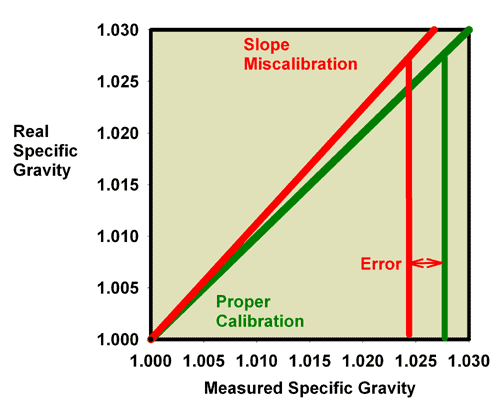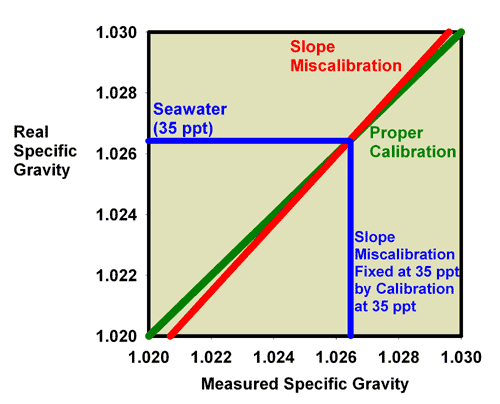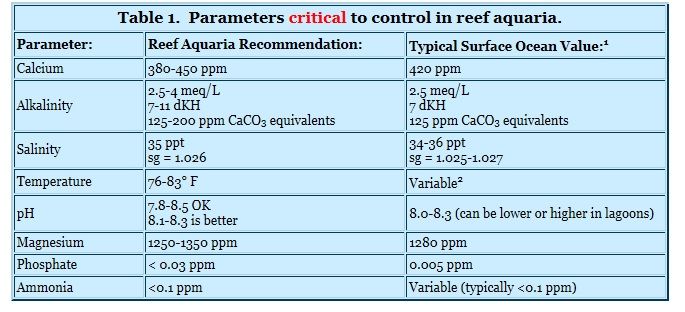You are using an out of date browser. It may not display this or other websites correctly.
You should upgrade or use an alternative browser.
You should upgrade or use an alternative browser.
HELP! Perimeters are to high
- Thread starter MaryAnn
- Start date
mr_tap_water
Well-Known Member
Just one more thing you never did answer The question how do you top up your evaporated water.
Sent from my iPhone using Tapatalk
Sent from my iPhone using Tapatalk
I find I have to recalibrate mine every time I use it and as above found RO water just as good just add free droplets on the Refractometer and reset to the bottom line then wipe with a dry cloth then add three drops Salt water to get your reading.
Sent from my iPhone using Tapatalk
I've always used distilled water (like $1.50 from walmart or wherever) instead of RO water. As a young un, I was told to do that instead of RO. I don't know why.
Whatever works, though.
I do have the calibration water you get specifically for calibrating refractometers but it's pointlessly expensive, so I don't really recommend it per se.
I'm in complete disagreement here.
You need to test the refractometer at both 0 and at 35 ppt. That is the only way you can be sure your correct over all ranges.
Some refractometers may be off equally over the entire scale. For those calibration with one solution will work, but others can be correct at one point and then off at the other. A single calibration with one solution will not catch this.
If you must use only one calibration solution get the 35 ppt one. It will be more accurate because it's closest to the SW you will actually be measuring. Note on some cheep refractometers, if you calibrate it using 35 ppt solution, you may find that it doesn't read 0 if you test RO/DI water or distilled water. That's because it a cheep refractometer. You can still use it though because it's been calibrated to normal SW ranges. However you do need to take this into consideration when doing brackish water or hypo salinity treatments.
Ok i found the little tool that came with it and i got it set then checked my tank water and its at 0.26 is that to high? Or is that where everyone keeps it?
Sent from my SM-G930R7 using Tapatalk
Any reading between about 1.023 to 1.028 is OK, with most people keeping their water at 1.025. However, it is much more important to be consistent and not vary the SG.
As a note, some LFS will keep their fish in water that is only 1.018 or so, figuring that it helps keep disease down. This is not as common as it once was, but do test the water the fish comes in before you start the acclimation process. If the SG is way low, you'll need to go a lot slower.
Pat24601
Well-Known Member
I'm in complete disagreement here.
You need to test the refractometer at both 0 and at 35 ppt. That is the only way you can be sure your correct over all ranges.
Some refractometers may be off equally over the entire scale. For those calibration with one solution will work, but others can be correct at one point and then off at the other. A single calibration with one solution will not catch this.
If you must use only one calibration solution get the 35 ppt one. It will be more accurate because it's closest to the SW you will actually be measuring. Note on some cheep refractometers, if you calibrate it using 35 ppt solution, you may find that it doesn't read 0 if you test RO/DI water or distilled water. That's because it a cheep refractometer. You can still use it though because it's been calibrated to normal SW ranges. However you do need to take this into consideration when doing brackish water or hypo salinity treatments.
This makes sense. It doesn't fit my personal experience with my refractometer, but I totally believe you it can and does with others.
mr_tap_water
Well-Known Member
I'm not sure if I've missed read something here but from reading through all the post just agreeing on having your SG at 0.26 that still doesn't resolve the problem of what your saying that you have high perimeters at 0.24 ,
As making it even higher still won't bring it down you find out what you're doing that's pushing it up in the first place.
From what I've gathered so far One The salt you use doesn't have that higher stats, two you are not dosing anything, and three you're using the refractor correctly. If this is all correct then we've all just gone round in circles and still none the wiser[emoji846]
Sent from my iPhone using Tapatalk
As making it even higher still won't bring it down you find out what you're doing that's pushing it up in the first place.
From what I've gathered so far One The salt you use doesn't have that higher stats, two you are not dosing anything, and three you're using the refractor correctly. If this is all correct then we've all just gone round in circles and still none the wiser[emoji846]
Sent from my iPhone using Tapatalk
mr_tap_water
Well-Known Member
I'm glad it got it sorted in the end and hope things work out for you now as mentioned above mentioning The Refractometer was on the right track then.[emoji846]Just trying to find an explanation for the high levels but do you clean the Refractometer Glass and check that it's reset to the bottom line, every time you use it also what do you clean it with ,
is there any chance of a picture of the Refractometer
How do you mix your salt and when do you test it as testing it at different temperatures can cause different SG readings to.
Also evaporation in your tank what do you top it up with.
Sent from my iPhone using Tapatalk
Sent from my iPhone using Tapatalk
Last edited:
stevedola
New Member
Here is a list of common reef salts and their composition of our big 3 elements
Salt Product
Calcium
Alkalinity
Magnesium
Aquatic Gardens
430
8
1240
Brightwell Neomarine
370
11
1140
CoraLife
560
9
1380
Crystal Sea Marinemix
340
9
1050
Crystal Sea Marinemix Bio-Assay
340
9
1050
D-D H2Ocean
450
10
1380
Instant Ocean
400
11
1350
Kent
540
11
1200
Marine Environment
480
7.5
1450
Oceanic
580
8.5
1650
OceanPure
510
10
1320
Red Sea
400
8
1300
Red Sea Coral Pro
470
12.5
1400
Reef Crystals
490
13
1440
Reefer's Best
420
11
1200
SeaChem aquavitro salinity
422
9.8
1336
SeaChem Marine Salt
500
10
1400
SeaChem Reef Salt
540
10
1450
Tropic Marin
375
10
1230
Tropic Marin Pro Reef
450
8.5
1380
Tunze Reef Salt
420
9.5
1350
Salt Product
Calcium
Alkalinity
Magnesium
Aquatic Gardens
430
8
1240
Brightwell Neomarine
370
11
1140
CoraLife
560
9
1380
Crystal Sea Marinemix
340
9
1050
Crystal Sea Marinemix Bio-Assay
340
9
1050
D-D H2Ocean
450
10
1380
Instant Ocean
400
11
1350
Kent
540
11
1200
Marine Environment
480
7.5
1450
Oceanic
580
8.5
1650
OceanPure
510
10
1320
Red Sea
400
8
1300
Red Sea Coral Pro
470
12.5
1400
Reef Crystals
490
13
1440
Reefer's Best
420
11
1200
SeaChem aquavitro salinity
422
9.8
1336
SeaChem Marine Salt
500
10
1400
SeaChem Reef Salt
540
10
1450
Tropic Marin
375
10
1230
Tropic Marin Pro Reef
450
8.5
1380
Tunze Reef Salt
420
9.5
1350
Here is a list of common reef salts and their composition of our big 3 elements
Salt Product
Calcium
Alkalinity
Magnesium
...
I'm not trying to give you a hard time, but do you have a source for this information?
What often happens when people do these kind of measurements is that they do not correctly measure or mix the salt. This skews the results making such measurements almost useless.
For example, a while ago, I saw a similar list, and then seeing that they prepared the SW samples by weighing the salt and then not bothering to test SG before doing the tests. This obviously messed up all the results.
stevedola
New Member
this test was performed within the last couple months.
Brand: Instant Ocean Reef Crystals
Temp: 78 (glass thermometer)
SG: 1.026 (35 ppt refractometer)
Alk: 15 dkh (tested 3 times with Red Sea Marine Care Test Kit)
Ca: 440 ppm (Red Sea Calcium Pro Test Kit)
Mag: 1240 ppm (Red Sea Magnesium Pro Test Kit)
IO Reef Crystals mixed with RO/DI and circulated for 24 hours.

------
Those readings are too high for dkh and too low Mag IMO. if this was my brand I would change.
Brand: Instant Ocean Reef Crystals
Temp: 78 (glass thermometer)
SG: 1.026 (35 ppt refractometer)
Alk: 15 dkh (tested 3 times with Red Sea Marine Care Test Kit)
Ca: 440 ppm (Red Sea Calcium Pro Test Kit)
Mag: 1240 ppm (Red Sea Magnesium Pro Test Kit)
IO Reef Crystals mixed with RO/DI and circulated for 24 hours.

------
Those readings are too high for dkh and too low Mag IMO. if this was my brand I would change.
stevedola
New Member
These readings are from an RCmod Bertoni who credited 2 members Billybeau1 and hilgert on their forum. I consider these tests reputable but if you have conflicting information please post your results.
All I am getting at is that regular testing of your salt should be performed. I have ruined tanks when I got a bad batch of IO salt years ago. IMO you must test from one bucket/box to the next. The QC on many of these synthetic salts are lacking and can cause issues. Reef Crystals is notorious for having fluxuations in composition batch to batch.
All I am getting at is that regular testing of your salt should be performed. I have ruined tanks when I got a bad batch of IO salt years ago. IMO you must test from one bucket/box to the next. The QC on many of these synthetic salts are lacking and can cause issues. Reef Crystals is notorious for having fluxuations in composition batch to batch.
Last edited:
mr_tap_water
Well-Known Member
I would have to disagree with some of those stats that you have mentioned on at least two of those brands I myself use D&D and get nowhere near those stats that you have suggested same with the red sea pro, if you look at these two pictures you can see they give you arrange between the stats meaning it could be anything from one end to the other of what they state,
And also very dramatically as well if you do not mix your new salt thoroughly when first buying it as some of these elements can settle to the bottom which will put your stats out when adding to your water.


I don't mean to come across argumentative I just wanted to show everyone that these three stats can vary and this is why they give you A from and TO Reading, and should be anything between those.
Sent from my iPhone using Tapatalk
And also very dramatically as well if you do not mix your new salt thoroughly when first buying it as some of these elements can settle to the bottom which will put your stats out when adding to your water.


I don't mean to come across argumentative I just wanted to show everyone that these three stats can vary and this is why they give you A from and TO Reading, and should be anything between those.
Sent from my iPhone using Tapatalk
chipmunkofdoom2
Well-Known Member
I find I have to recalibrate mine every time I use it and as above found RO water just as good just add free droplets on the Refractometer and reset to the bottom line then wipe with a dry cloth then add three drops Salt water to get your reading.
Sent from my iPhone using Tapatalk
In some cases, RO/DI or distilled water will be just as good, but that isn't necessarily the case. I think that is why this is still such a debated topic. For some reefers, this method is accurate, but for others it isn't. It really depends on the refractometer: calibrating with freshwater assumes that the refractometer is consistent across the entire range of measurement. There's a vast difference in measuring the refractive index of freshwater and measuring the RI of saltwater.
Check out Randy Holmes-Farley's points on slope miscalibration. The long and short is that some refractometers may not be accurate over their entire range of measurement. That means by calibrating to 1.000SG you are ensuring that the reading is accurate at 1.000SG. However, as salinity goes up, small errors in accuracy become compounded, and get larger and larger:

In this hypothetical case, calibrating with freshwater produces inaccurate salinity readings. The refractometer will say your water is 1.026SG, when in reality it is closer to 1.024. Here is what happens when we correctly calibrate this hypothetical refractometer with calibration fluid:

Notice how the red and green lines are split at the bottom of the graph? What this means is that when you read freshwater with this hypothetical refractometer, it will actually read higher than 1.000SG. But that's okay. This refractometer is not consistent across its entire range. What we do know, however, is that the refractometer is exactly accurate at 1.026SG because we calibrated at that point with calibration fluid.
Calibrating with freshwater will still produce consistent results, and since consistency is really key with salinity, it likely won't hurt anything in your tank. However, it could produce inaccurate results. The only way freshwater calibration would produce accurate results at higher ranges is if your refractometer was consistent across the entire range of measurement. With hobby-grade refractometers, this is not a bet I'd be willing to take. There are some out there that will measure accurately at both ends of the scale, but I haven't had much luck finding one.
We spend hundreds to thousands of dollars on our reef setups. When calibration fluid is just $7 shipped, calibrating with freshwater to get "close enough" just doesn't make any sense to me. But, to each his own.

